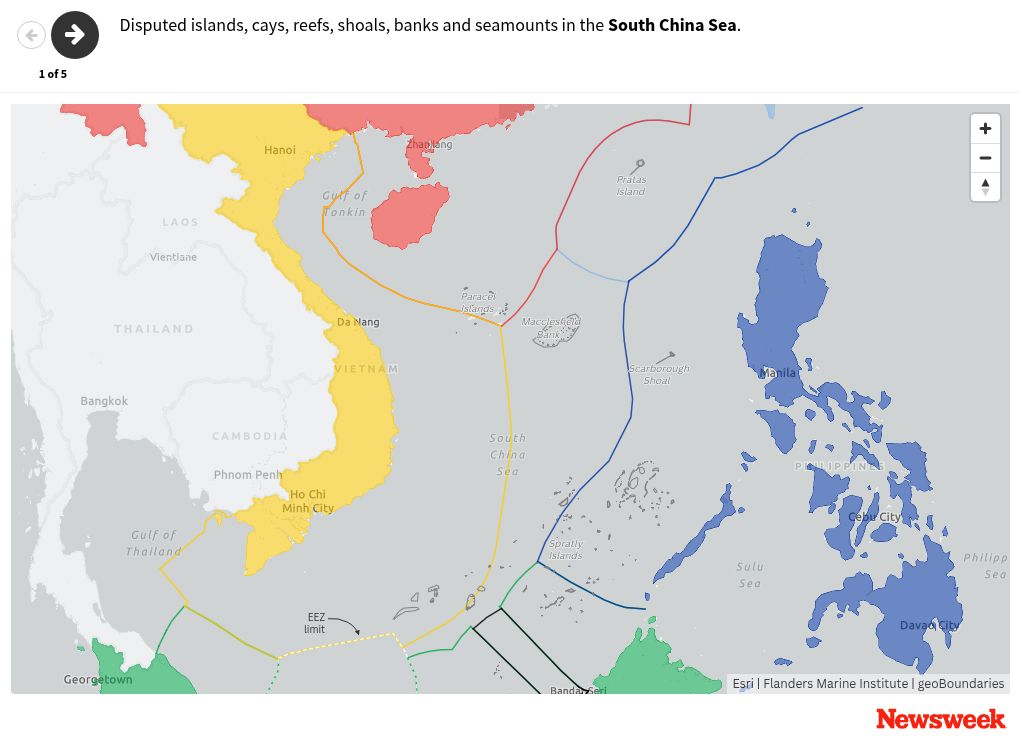China’s efforts to expand its sphere of influence in its own region and beyond are part of its “political DNA” and a growing number of countries are coalescing against it, Philippine Defense Secretary Gilberto Teodoro told Newsweek in an interview.
Following a tense exchange with Chinese officials at the Shangri-La Dialogue in Singapore, Asia’s premier defense summit, Teodoro called Beijing “the cause of instability”.
Newsweek contacted the Chinese Foreign Ministry by email with a request for comment.
Why It Matters
Teodoro’s comments reflect the toughening stance by the Philippines, a U.S. treaty ally, under President Ferdinand Marcos Jr. over China’s claims in its exclusive economic zone.
China claims up to 90 percent of the South China Sea as its territory, citing what it calls historical rights within its self-declared nine-dash line—a boundary that overlaps with the maritime claims of the Philippines, Vietnam, Malaysia, Brunei, and self-ruling Taiwan.
Footage released by the Philippines has shown the Chinese coast guard using ramming maneuvers and water cannon attacks that Manila said left Philippine servicemen injured.
A Hague-based arbitral tribunal dismissed China’s dashed-line claims in a 2016 decision Beijing rejected as invalid.
What To Know
Beijing’s agenda is rooted in its leadership structure, Teodoro told Newsweek on Sunday. “That is to extend the sphere of influence of dynastic politics of whatever nature, and it is within their DNA to be that—their political DNA.”
“The impression of other countries is that of weariness, caution, and not comfort. Even those who engage with them fully do not fully trust China.”
Still, China remains a major trade partner for some 150 countries, according to Beijing’s customs administration—and for most of Southeast Asia—a fact Teodoro acknowledged has likely muted some nations’ responses.
“But this has got to stop somewhere. And the countries that are standing up are coalescing against China,” he said. “And if they [China] do not notice this […] and spin the narrative as it being to contain their rightful place, then they’re just fooling themselves.”
He expects “more of the same” from Beijing. The Philippines is therefore working to form an international coalition to increase deterrence, he added, likening this to erecting “a strong fence.”
China’s actions in the South China Sea have also been met with strong protests from Washington and several Asian-Pacific and European nations.
Adding to tensions are alleged espionage operations near military installations, mass cyberattack campaigns, and unsafe military encounters reported by U.S. allies in international waters.

Deterrence of China would take two forms, Teodoro said: “building up capability resilience” and fostering “international resonance that will condemn their activities.”
During his remarks in a Shangri-La panel on Sunday, Teodoro was challenged by two senior Chinese colonels, who asked whether the Philippines would engage with China on friendly terms or choose to play the part of a U.S. proxy.
Teodoro thanked the officials for “propaganda spiels disguised as questions,” a barb that drew applause from attendees. He said the “deficit of trust” in China remains the largest obstacle to a solution in the South China Sea, adding that a nation that “represses its own people” is not to be trusted.
What’s Next
A breakthrough in the South China Sea dispute remains unlikely, with both China and the Philippines firmly entrenched. The fact that the Philippines is a U.S. treaty ally makes it a potential flashpoint for global conflict at a time of tension between Washington and Beijing on numerous fronts.
The post US Ally Sends Strong Warning to China appeared first on Newsweek.




